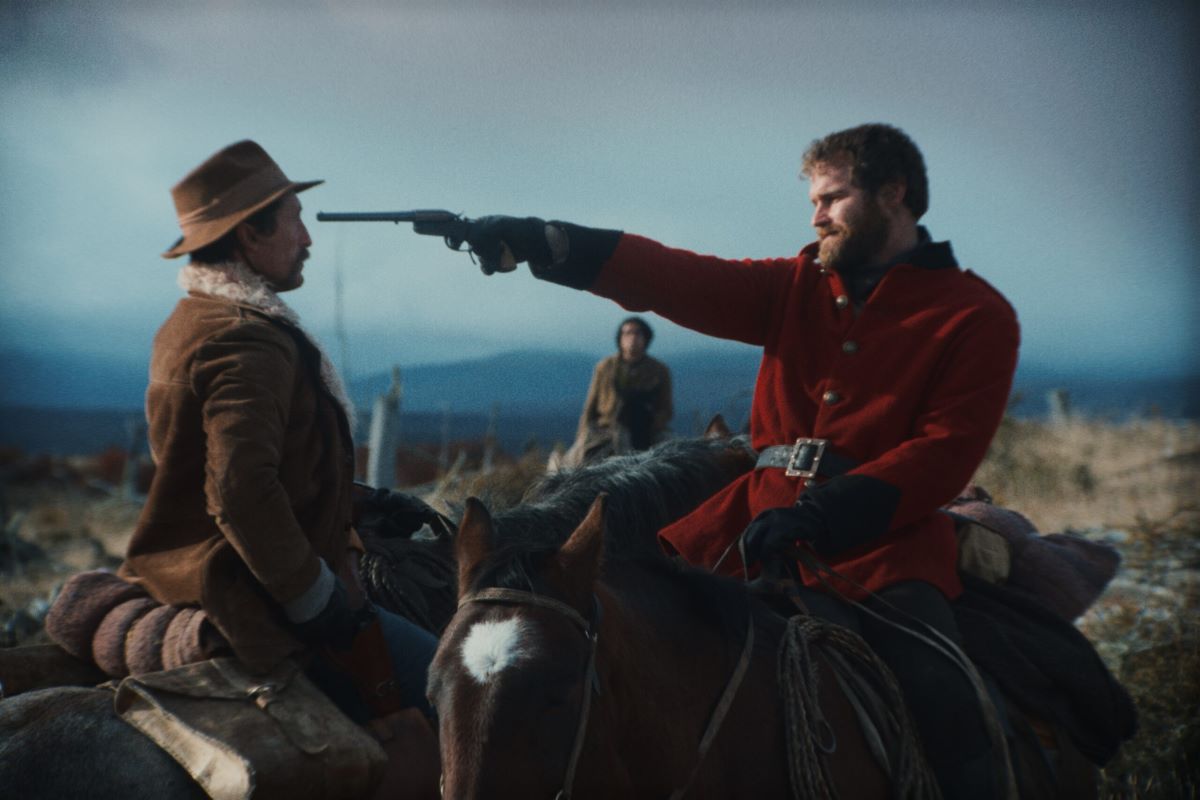After being featured in the Un Certain Regard section at the 2023 Cannes Film Festival, Felipe Gálvez Haberle’s Los Colonos (The Settlers) has arrived on MUBI as of March 7. The Chilean director’s feature debut outlines a western epic set in a Patagonia left to greed and the survival of the fittest, in dialogue with other films that have revisited this foundational cinematic genre by centering on the oppressed, like the recent Killers of the Flower Moon by Martin Scorsese and Jauja by Lisandro Alonso (2014).
Los Colonos, the plot: The western moves to Chile
The action takes place in Tierra del Fuego, in 1901, and references the prolonged and atrocious genocide of the Selknam people, also known as Ona. It’s said that when the white settlers arrived, there were about 4,000 Ona; by the beginning of the 20th century, only 783 remained, almost all refugees in the Salesian missions led by Monsignor Giuseppe Fagnano.
The story of Los Colonos, divided into chapters that give a progression to the action, revolves around a ruthless land administrator (Alfredo Castro) who hires the services of a Scottish military man with a dubious criminal record (Mark Stanley) to exterminate the native populations of the area, the Selknam. Along with two other men, a Texan and a mestizo (Benjamin Westfall and Camilo Arancibia), the expedition begins, moving from Chile towards Argentina, where the geographical border is imprecise, but the land ownership is not. This encounter with the representation of the “national being” settled in an outpost with more doubts than certainties gives rise to a brutal historical portrait, where the expert Francisco Moreno (Mariano Llinás) tries to mark the geographical limits. Gálvez Haberle then shifts the narrative seven years later, when an envoy of President Montt arrives in Chiloé to investigate the extermination.
A classic journey, but in uncharted territories
Los Colonos portrays with a western epic the other side that the cinematic imagination hid in the “civilizing advance” of the “white man.” We are facing a classic western with modernist touches, close to the famous “anti-westerns” that proliferated in the ’60s and ’70s and which directors like Kelly Reichardt (Meek’s Cutoff) or Lisandro Alonso have recently reclaimed in Jauja: essentially, the first work of the Chilean Felipe Gálvez bets on a classic journey of the western cinema, only told from another perspective, place, and circumstance.
Los Colonos carries out its western mission through a series of strong scenes of violence in later stages, moving away from a sense of lightness to place its characters in increasingly dark areas. Over time, these will also have to confront each other, as their differences begin to become more and more apparent, and they will face another type of ferocity, that of “internal” affairs.
Colonos as Conquistadores
Director Felipe Gálvez weaves real and fictional characters, making his directorial debut after fifteen years of working as an editor, in this award-winning Patagonian western about the genocide of the Selknam as the foundation of Chilean civilization, almost as a South American answer to Martin Scorsese’s recent Killers of the Flower Moon.
What Gálvez accomplishes is a harsh critique of the extermination of indigenous peoples, the abuses of capitalism, and the massive control of land held by a few groups and families, without speaking too directly of these themes. In the way Menéndez behaves, in the way the military, officials, and explorers advance over everything and everyone as if they owned every inch they step on and demarcate, Los Colonos tells the cruel story of the origins of a country (or two, perhaps) marked by physical, political, and economic violence.
In Los Colonos, violence and pain are whispered
Gálvez has the sense, elegance, and intelligence to suggest more than he shows: it’s clear that atrocities of every kind are happening, but they are intuited, seen from afar, understood through certain dialogues (always in the name of “progress”). The exteriors of the pristine nature of southern Chile and Argentina are so breathtaking that there’s no way for Gálvez and his cinematographer Simone D’Arcangelo to avoid indulging in certain preciousness, but the sensory experience – an extraordinary sound work and the music of Harry Allouche – is engaging and impressive.
Crossing the landscapes of Tierra del Fuego, Felipe Gálvez also traverses a good part of the genre’s biography: from the laconic cruelty of B-series western to its European revision, through the unalibied violence of Ulzana’s Raid and the abstract scenarios of Jauja. In this horseback road movie, featuring two criminals and a silent witness, a mestizo complicit in the madness of their journey, all these references permeate, unnoticed, his images in a way as energetic as it is unsettling. There’s definitely something of horror in this film, as if it were a political version of S. Craig Zahler’s Bone Tomahawk with the rough and sharp poetics of Cormac McCarthy.
Agnese Albertini
Cinefilos, March 6, 2024





